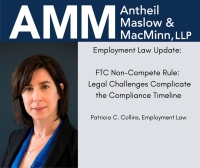Accordingly, the Final Rule not only requires employers not to enter into or “attempt to enter into” employee non-compete agreements, it also requires employers to rescind their existing non-compete agreements, and then notify the current and former employees that the non-compete is rescinded within forty-five days. The Final Rule provides a form for the notice of recission. The obligation to rescind existing non-compete clauses does not apply where a cause of action related to a non-compete clause accrued prior to September 4, 2024.
There are a few exceptions. The ban will not apply to sales of a bona fide business or its assets. The Final Rule has limited application to “senior executives”. For those employees, it is considered an unfair trade practice to enter into or attempt to enter into a non-compete clause, or to enforce or attempt to enforce a non-compete entered into after the effective date, leaving employers free to enforce non-compete clauses entered into with senior executives prior to the effective date. The Federal Trade Commission Act, which provides the authority for the Final Rule, also does not apply to the following industries: banking, savings and loan institutions, federal credit unions, common carriers, air carriers and foreign air carries and certain persons subject to the Packers and Stockyards Act. It also does not apply to franchisors and franchisees (although it does apply to their employees).
Employees subject to non-competes can prepare by ensuring that no cause of action accrues prior to the effective date. Employees can use the uncertainty surrounding the Final Rule in negotiating employment agreements with new employers. Employees should ensure that they are complying with any trade secret, confidential information or non-solicitation provisions. They should also take steps to determine whether they are considered “senior executives” (such that their non-competes will stay in place) or if any other exception applies.
Employers must take steps to identify which employees are subject to the Final Rule. They must prepare to issue rescission notices to employees who are not “senior executives” and do not fall under any other exceptions. Negotiation of new employment agreements is complicated by the looming impact of the Final Rule. For this reason, employers should ensure that they have enforceable agreements with employees to protect trade secrets, confidential information, and key customer and employee relationships. This will be the only means available to employers to protect those interests should the Final Rule take effect. Employers should ensure that existing agreements have the appropriate severability clauses such that if the non-compete section is rescinded, the rest of the agreement stays in place. They should also ensure that the provision is drafted in such a way that it is severable from the rest of the employment agreement.
For both groups, the “effective date” triggers all of the next steps. But pending litigation may result in a delay of that date. On April 23, 2024, just hours after the announcement of the Final Rule, Ryan LLC filed an action in the Northern District of Texas challenging it. Ryan, LLC v. Federal Trade Commission, Civil Action Number 24-cv-00986. Ryan filed a Motion for Preliminary Injunction seeking a stay of the Final Rule on May 1, 2024, and the FTC filed its response on May 29, 2024. If a hearing is held, it will take place on June 17, 2024 and a decision is expected on July 3, 2024.
On April 24, 2024, the United States Chamber of Commerce, along with several other business associations, filed an action in the Eastern District of Texas challenging the Final Rule and seeking a stay of the effective date. Chamber of Commerce v. Federal Trade Commission, Civil Action Number 24 -cv-00148. That case was dismissed on the grounds that the Ryan case was filed first, and the Plaintiffs in that action have intervened in the Ryan action.
On April 25, 2024, ATS Tree Services, LLC filed an action in the Eastern District of Pennsylvania challenging the Final Rule. ATS Tree Services, LLC v. Federal Trade Commission, Civil Action Number 24-cv-1743. ATS Tree Services filed a Motion for Preliminary Injunction on May 14, 2024 seeking a stay of the effective date, and a response was filed on June 4, 2024. If a hearing is necessary it will be held on July 10, 2024, and a decision is expected on July 23, 2024.
With decisions expected in July, this will give employers and employees a short period of time to prepare for compliance, should the rule survive these challenges. Employers should prepare by identifying impacted employees and reviewing existing agreements. More uncertainty may await if the courts come to conflicting decisions on the Final Rule. In the meantime, the prospect of the Final Rule impacts employment agreement drafting and negotiations; and decisions about hiring, resignations and terminations, and accepting new positions.
Patricia Collins is a Partner and Employment Law Chair with Antheil Maslow & MacMinn, LLP, based in Doylestown, PA. Her practice focuses primarily on employment, commercial litigation and health care law. Patricia Collins can be contacted at 215.230.7500 ext. 126.





















